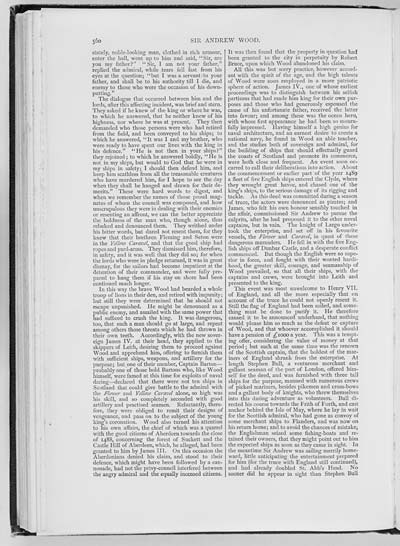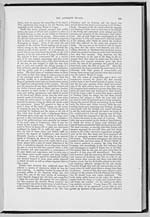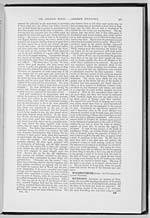Volume 3 > Half-Volume 6
(206) Page 560
Download files
Individual page:
Thumbnail gallery: Grid view | List view

56o stately, noble-looking man, clothed in rich armour, enter the hall, went up to him and said, "Sir, are you my father?" " Sir, I am not your father," replied the admiral, while tears fell fast from his eyes at the question; "but I was a servant to your father, and shall be to his authority till I die, and enemy to those who were the occasion of his down- putting." The dialogue that occurred between him and the lords, after this affecting incident, was brief and stern. They asked if he knew of the king or where he was, to which he answered, that he neither knew of his highness, nor where he was at present. They then demanded who those persons were who had retired from the field, and been conveyed to his ships; to which he answered, "It was I and my brother, who were ready to have spent our lives with the king in his defence." "He is not then in your ships?" they rejoined; to which he answered boldly, "He is not in my ships, but would to God that he were in my ships in safety; I should then defend him, and keep him scathless from all the treasonable creatures who have murdered him, for I hope to see the day when they shall be hanged and drawn for their de- merits." These were hard words to digest, and when we remember the names of those proud mag- nates of whom the council was composed, and how unscrupulous they were in dealing with their enemies or resenting an affront, we can the better appreciate the boldness of the man who, though alone, thus rebuked and denounced them. They writhed under his bitter words, but dared not resent them, for they knew that their brethren Fleming and Seton were in the Yellow Caravel, and that the good ship had ropes and yard-arms. They dismissed him, therefore, in safety, and it was well that they did so; for when the lords who were in pledge returned, it was in great dismay, for the sailors had become impatient at the detention of their commander, and were fully pre- pared to hang them if his stay on shore had been continued much longer. In this way the brave Wood had bearded a whole troop of lions in their den, and retired with impunity; but still they were determined that he should not escape unpunished. He might be denounced as a public enemy, and assailed with the same power that had sufficed to crush the king. It was dangerous, too, that such a man should go at large, and repeat among others those threats which he had thrown in their own teeth. Accordingly, with the new sover- eign James IV. at their head, they applied to the skippers of Leith, desiring them to proceed against Wood and apprehend him, offering to furnish them with sufficient ships, weapons, and artillery for the purpose; but one of their number, Captain Barton� probably one of those bold Bartons who, like Wood himself, were famed at this time for exploits of naval daring�declared that there were not ten ships in Scotland that could give battle to the admiral with the Flower and Yellow Caravel alone, so high was his skill, and so completely seconded with good artillery and practised seamen. Reluctantly, there- fore, they were obliged to remit their designs of vengeance, and pass on to the subject of the young king's coronation. Wood also turned his attention to his own affairs, the chief of which was a quarrel with the good citizens of Aberdeen towards the close of 1488, concerning the forest of Suckett and the Castle Hill of Aberdeen, which, he alleged, had been granted to him by James III. On this occasion the Aberdonians denied his claim, and stood to their defence, which might have been followed by a can- nonade, had not the privy-council interfered between the angry admiral and the equally incensed citizens. It was then found that the property in question had been granted to the city in perpetuity by Robert Bruce, upon which Wood abandoned his claim. All this was but sorry practice, however accord- ant with the spirit of the age, and the high talents of Wood were soon employed in a more patriotic sphere of action. James IV., one of whose earliest proceedings was to distinguish between his selfish partisans that had made him king for their own pur- poses and those who had generously espoused the cause of his unfortunate father, received the latter into favour; and among these was the ocean hero, with whose first appearance he had been so mourn- fully impressed. Having himself a high genius for naval architecture, and an earnest desire to create a national navy, he found in Wood an able teacher, and the studies both of sovereign and admiral, for the building of ships that should effectually guard the coasts of Scotland and promote its commerce, were both close and frequent. An event soon oc- curred to call their deliberations into action. About the commencement or earlier part of the year 1489 a fleet of five English ships entered the Clyde, where they wrought great havoc, and chased one of the king's ships, to the serious damage of its rigging and tackle. As this deed was committed during a season of truce, the actors were denounced as pirates; and James, who felt his own honour sensibly touched in the affair, commissioned Sir Andrew to pursue the culprits, after he had proposed it to the other naval captains, but in vain. The knight of Largo under- took the enterprise, and set off in his favourite vessels, the Flower and Caravel, in quest of these dangerous marauders. He fell in with the five Eng- lish ships off Dunbar Castle, and a desperate conflict commenced. But though the English were so supe- rior in force, and fought with their wonted hardi- hood, the greater skill, courage, and seamanship of Wood prevailed, so that all their ships, with the captains and crews, were brought into Leith and presented to the king. This event was most unwelcome to Henry VII. of England, and all the more especially that on account of the truce he could not openly resent it. Still the flag of England had been soiled, and some- thing must be done to purify it. He therefore caused it to be announced underhand, that nothing would please him so much as the defeat or capture of Wood, and that whoever accomplished it should have a pension of �1000 a year. This was a tempt- ing offer, considering the value of money at that period; but such at the same time was the renown of the Scottish captain, that the boldest of the mar- iners of England shrunk from the enterprise. At length Stephen Bull, a venturous merchant and gallant seaman of the port of London, offered him- self for the deed, and was furnished with three tall ships for the purpose, manned with numerous crews of picked mariners, besides pikemen and cross-bows and a gallant body of knights, who threw themselves into this daring adventure as volunteers. Bull di- rected his course towards the Frith of Forth, and cast anchor behind the Isle of May, where he lay in wait for the Scottish admiral, who had gone as convoy of some merchant ships to Flanders, and was now on his return home; and to avoid the chances of mistake, the Englishman seized some fishing-boats and re- tained their owners, that they might point out to him the expected ships as soon as they came in sight. In the meantime Sir Andrew was sailing merrily home- ward, little anticipating the entertainment prepared for him (for the truce with England still continued), and had already doubled St. Abb's Head. No sooner did he appear in sight than Stephen Bull
Set display mode to:
![]() Universal Viewer |
Universal Viewer | ![]() Mirador |
Large image | Transcription
Mirador |
Large image | Transcription
Images and transcriptions on this page, including medium image downloads, may be used under the Creative Commons Attribution 4.0 International Licence unless otherwise stated. ![]()
| Biographical dictionary of eminent Scotsmen > Volume 3 > Half-Volume 6 > (206) Page 560 |
|---|
| Permanent URL | https://digital.nls.uk/74514686 |
|---|---|
| Attribution and copyright: |
|
| Description | Volume III. Contains names alphabetically from Macadam to Young. |
|---|

